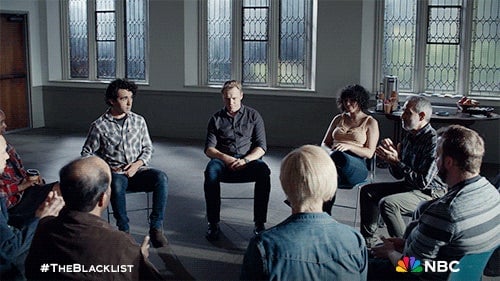AA: The good, the bad, and the sober
How AA’s 12 steps survived to become a modern-day program used by millions.

AA says nay to big money
Suggested Reading
Even though Alcoholics Anonymous (AA) has more members than Amazon has employees, you won’t see online advertisements for the 12-step recovery program designed to help alcoholics stop drinking.
Related Content
That’s because AA, a concept started in the 1930s by Wall Street investor Bill Wilson, struggled in its early days to decide whether or not to prioritize profits or purpose. At first, Wilson and his partner Bob Smith appealed to the likes of John D. Rockefeller, Jr. for funding and envisioned taking AA into hospitals at cost. But ultimately its members decided to turn down any sort of outside funding. They established 12 traditions that made the program both free to its members and free from outside influence — only people who are members of AA can donate to the organization, and even then, their contributions are limited.
AA is both loved and hated. Those who love it credit the 12-step recovery program with saving their lives, introducing them to life-long friends, and helping them find their true purpose. Critics call it “a cult that relies on God as the mechanism of action.”
But like it or not, AA is here to stay. It’s grown from a mere one hundred members in 1939 to about 2 million across the globe. There’s meetings for Grateful Dead-lovers, LGBTQ+ people, people of color, old people, young people, atheists, artists — you name it, there’s probably an AA meeting for it.
By the digits
$0: Money required to be an AA member, but groups can voluntarily collect funds during meetings to cover expenses
2: AA members in 1935. This includes founder Bill Wilson and his first sponsee, American physician Bob Smith.
1.97 million: AA members across the globe as of 2021.
29.5 million: People in the U.S. ages 12 and older with alcohol-use disorder
37 million: AA “big books” sold worldwide by 2019, making it one of the best-selling books of all time. The books were written by Wilson and have been updated to include stories of modern-day recovering alcoholics and translated into at least 43 languages.
Explain it like I’m 5!
The structure of AA
AA, unlike most activities and programs in today’s world, is free. So while meeting-goers are asked to donate $1 to $3 typically to help groups cover rent and expenses like coffee, they’re never required to pay to participate. Only AA members can financially contribute to AA.
AA’s organizational structure has been likened to an upside-down triangle, with individual groups at the top. There’s a central office in New York run by staffers and volunteers. Those staffers’ salaries are paid by donations and AA literature sales, and AA conventions.
Even though negative stereotypes mean people associate alcoholism with people who are drunk all day, houseless, or unable to hold down a job, the true definition of alcoholism, according to AA, is someone who is unable to control their drinking. These people have the “phenomenon of craving” and the “manifestation of an allergy” to alcohol. They may try to change their “brand” (drink beer instead of liquor), their “environment” (only drinking at home), or take periods of abstinence (i.e. “dry January”) only to find their alcohol consumption more uncontrollable afterwards, according to the AA Big Book.
In these meetings, newcomers are encouraged to get “sponsors” (no money is involved) to guide them through the 12 steps, which, most of the time, involves reading the AA Big Book and some other AA-approved literature and doing written exercises. But by the end — huzzah! — AA promises that former drunks will achieve a “spiritual awakening,” if they do the steps thoroughly (even if that awakening is “of the educational variety”).
Quotable
“Are you a friend of Bill?” —What people in AA say to strangers who they suspect are also members of AA without outing themselves
Pop quiz

Which is not the name of an AA meeting?
A. The Jesus Way
B. What’s the Point
C. A Check-Up from the Neck Up (Get Your Mind Right)
D. Girls Gone Mild
Find the answer at the bottom of this email.
Brief history
1935: Wilson holds the first weekly AA meetings at his home in Brooklyn, New York.
1936: Wilson and his fellow AA members turn down an offer to get paid for their work at Towns Hospital in New York City, worrying that doing the job for money will “violate its integrity.”
1941: The first “special interest” AA meeting is formed, an all-women group in Cleveland, paving the way for future groups that design themselves around their AA members’ identities.
1984: AA’s office in New York hires its first Spanish services staff position.
1991: The first Native American AA convention is held in Las Vegas.
2012: The AA Big Book is named as one of the 88 “Books that Shaped America” by the Library of Congress.
2020: With the onset of the covid pandemic, most meetings go online through Zoom.
2024: AA plans to publish a “plain language” Big Book that’s more gender-balanced and accessible to people of lower reading levels.
Fun fact
John D. Rockefeller, Jr. played a role in the early days of AA. Bill W. and Dr. Bob approached Rockefeller for funding in 1939, but it was ultimately decided that the money would dilute AA’s purpose. Rockefeller hosted an exclusive dinner at the Union Club in New York City to promote AA and its mission, and it gained widespread publicity.
Watch this!
AA is all over TV and movies
AA’s gone from being a little-known group to a worldwide phenomenon that’s frequently referenced (and debated) in pop culture.
AA made its debut in Hollywood in the 1940s. While its actual efficacy is still widely debated, AA is still a star in the entertainment world. Single Drunk Female (2022) is wholly focused on a young (single, drunk) woman’s sobriety journey through AA, Zendaya goes to 12-step recovery meetings in Euphoria, Joaquin Phoenix and Jonah Hill do AA in Don’t Worry, He Won’t Get Far on Foot, Emily Blunt in The Girl on the Train — you get the point.
Take me down this 🐰 hole!
AA’s Big Book has racist and sexist undertones that are a topic of contention much like the U.S. Constitution. There’s a chapter called “To Wives” in which Wilson asks wives to be kind to their alcoholic husbands who wronged them. Then there’s the fact that Wilson chides an earlier recovery group, the Washingtonian Society, for becoming divided over the “abolition of slavery,” which he describes simply as “a stormy political issue” rather than a battle for human rights. The Washingtonian Society’s demise is what inspired AA to institute its tradition that “Alcoholics Anonymous has no opinion on outside issues; hence the AA name ought never be drawn into public controversy.”
Luckily, special interest groups provide safe spaces for marginalized groups to alter the language of the texts in conversation (changing pronouns to be more inclusive, for example, or substituting the word “God” with “higher power”) as they see fit while maintaining AA’s core messages of community and recovery.
Poll

Do you think groups like AA are still relevant?
- Yes, they’re lifesaving.
- No, we need better resources for substance use disorder.
- I’m not sure, but I do wonder how much the Big Book weighs.
💬 Let’s talk
In last week’s poll on Grateful Dead shirts, 64% of you said you’d spend a max of $50 on a t-shirt with your favorite band on it. OK, fan not fanatic, we get it. That category is left to only the 2% of you who don’t think money is an object when it comes to being the one and only true fan.
Today’s email was written by Laura Bratton (who is living her Diet Coke dreams) and edited and produced by Morgan Haefner (is really into Athletic Brewing Upside Dawn).
The correct answer to the pop quiz is A., The Jesus Way. AA is not allied with any sect, denomination, politics, or institution — including Christianity. While it uses “God” to refer to the “higher power” AA-goers are directed to find through the 12 steps, there’s no religious AA meetings.